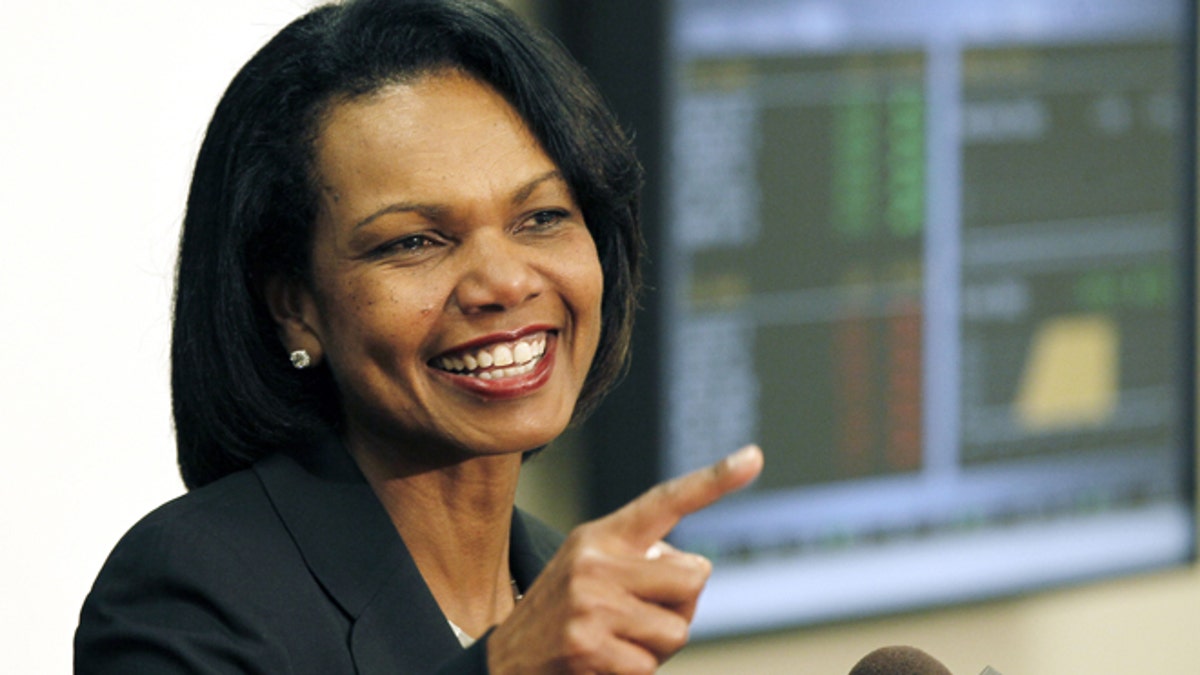
April 17, 2012: Former Secretary of State Condoleezza Rice answers questions from reporters about the issues she discussed with business students during a private presentation to them at Mississippi College in Clinton, Miss. ((AP Photo/Rogelio V. Solis))
Washington’s favorite gossip game — speculating about the vice presidential pick — now gets serious.
Following last week’s five-state primary sweep, Mitt Romney has forced even the last hold-out, former Speaker Newt Gingrich, to acknowledge reality: Romney has a lock on the GOP’s 2012 presidential nomination.
The next step for Romney is to introduce himself to America as a general election candidate. It will be tough. He begins with negative favorability ratings — especially compared to President Obama.
The ABC News/Washington Post poll shows 47 percent of Americans holding an unfavorable opinion of Romney with just 35 percent viewing him favorably. Obama has a 21-point advantage with a 56 percent favorability rating.
Romney is fighting the image created over the primary campaign in which he came across as an out-of-touch rich guy, pandering to the right wing by flip-flopping on the moderate Republican positions he held as governor of Massachusetts.
Romney also has to flip the script on the perception that he is ‘Your Father’s Oldsmobile’: a patrician, white Republican male with no sense of the changing racial make-up of America or the reality that women are now power players in the workplace and in politics.
[pullquote]
The biggest move he can make to change his image is via an eye-catching pick for the number two slot on the presidential ticket.
A CNN/ORC poll from last week asked Republicans and Republican-leaning independents to pick their preference for Romney’s running mate. At the top was a surprise choice: Former Secretary of State Condoleezza Rice. She attracted 26 percent support. Rick Santorum won second place with 21 percent support. New Jersey Gov. Chris Christie and Florida Sen. Marco Rubio were tied for third place with 14 percent each. At the meeting of state GOP chairmen in Arizona last week half of them told a National Journal reporter they wanted Romney to pick Rice.
Rice would be a political game changer for the 2012 race.
Yes, she would be the first African-American woman to be on a major party’s presidential ticket, at a time when the GOP is losing ground with minority and female voters.
But she is more than that because — unlike some other prospects — her selection can never be dismissed as racial tokenism. She is an experienced political player who has scars from previous battles; former Vice President Dick Cheney and former Defense Secretary Donald Rumsfeld are still taking shots at her in their latest books.
And her expertise on foreign policy, as a former secretary of state, would compensate for Romney’s lack of international experience. As a governor and a businessman, Romney dealt almost exclusively with domestic policy.
Keep in mind, Rice has a strong political spine. She flew in the face of anti-immigrant fervor from the GOP right wing recently by standing up for immigrants. She opposed individual states, beginning with Arizona, passing laws to increase pursuit of illegal immigrants. That position — politically daring in the modern-day GOP — will be a big help as the Romney campaign tries to win over Latino voters.
There is another critical reason why Romney should pick Rice. Over the last few months, she has partnered with Joel Klein, the former chancellor of the New York City public school system, to draw attention to the crisis in American public education. They co-chaired a Council on Foreign Relations panel that examined the failure of public education as a threat to America’s national security.
They found that 75 percent of American young adults do not qualify to serve in the military because they have criminal records, are physically unfit or — the biggest reason — have inadequate levels of education. One out of every four American students fails to get the high school diploma needed to join the military.
This includes about half of the nation’s black and Hispanic students, who drop out of high school. Even more disturbing is the report’s finding that 30 percent of the young people graduating from America’s high schools don’t do well enough in math, science and English on the aptitude test to serve in the military.
The report also screamed out that the U.S. State Department is unable to find enough foreign-language speakers to serve as interpreters and translators.
“The education crisis may well be the greatest threat to our national security,” Rice explained at a recent speech before the Heritage Foundation in Washington.
“The crisis in K-12 is producing unemployable people who will ultimately be on the dole because they will have nowhere else to go.”
In his election night speech in New Hampshire last week, Romney said he wanted to “stop the unfairness of urban children being denied access to the good schools of their choice.”
Rice has exactly the right message to jump start the education debate.
By putting Rice on the ticket Romney could reform his image and give the education reform movement a boost. And win or lose in November, he will have created a political legacy for himself and done his country a great service.
Juan Williams is an author and political analyst for Fox News Channel. This column originally appeared in The Hill newspaper and on TheHill.com.








































